Category Archives: Church
Vietnam Fifty Years Later
I came of age during the Vietnam War. During my junior year of high school, I braced for the draft lottery system, a process whereby I would be assigned a number that could drag me off to the other side of the globe. But, fifty years ago, in January 1973, the Vietnam draft ended. I intended to do alternative service as others in my church and family had before me.
I remember a buddy in high school who wanted nothing more than to fight communists in Vietnam. In studying the Vietnam Veterans Memorial in Washington, D.C., I’ve never discovered his name on the wall, so he must have made it through the hell of fighting in Southeast Asia.
For the Mennonite missionaries and MCC workers who served in Vietnam, it was challenging for them to communicate the moral problems of U.S. engagement in Vietnam. Missionaries lived and worked in South Vietnamese neighborhoods where they heard helicopters strike with blazing fury and watched U.S. bombers fly overhead and drop deadly explosives. They tried to distinguish themselves from U.S. soldiers.
It was difficult for a young Mennonite surgeon to watch deadly attacks near him and stitch up the wounded in his evangelical hospital. The moral complexities he and others faced are easy to spot when reading articles by Mennonites who served in Vietnam during the war. They had volunteered to serve as missionaries or MCC workers, but they felt called to communicate with folks back home about the destructive havoc and death dealt by their government.
I remember reading Time and Newsweek while in middle and high school and seeing images of the war. We watched some black and white television in my home, enough that I could observe the Southeast Asia violence. It was my war because I thought Selective Service would call me up next for the draft, and Vietnam helped clarify my beliefs about peace.
At times the Mennonite personnel in Vietnam found their relations strained with other missionaries. Mennonites believed in peace, had come to serve, and generally chose not to use U.S. military air transport in their relief efforts. Other agencies used the U.S. military transport system and supported the war.
I heard about the young Mennonite volunteer from Ohio who vanished while serving in Vietnam, never heard from again. Mennonites served in Vietnam, and they did their best to communicate about the horrible conditions the people of Vietnam faced. They wrote letters of concern to their churches, their members of Congress, and the President. Some refused to serve, and one young man near my home burned his draft card. On the other hand, during the Vietnam War, 1964-1975, hundreds of Mennonite young adults who were conscientious objectors to war chose voluntary service in the U.S. or with international development agencies.
As U.S. troops departed Vietnam in 1973-75, and the last helicopter frantically rose from Saigon, a Mennonite Central Committee worker observed the ugly long-term effects of the war. Several million unexploded bombs, artillery shells, and mortar rounds littered the fields and forests of Vietnam.
Many from my generation served in the military as best they could during the Vietnam War, responding as good citizens to the demands of their commanders. I, however, look to the voices of peace from those who worked in Vietnam, messengers of a different kingdom, entangled in moral dilemmas that got them criticized by folks back home. I hope leaders today, fifty years after the draft ended in “my war,” can learn from the impact of getting involved in wars on distant shores. As in Vietnam, it can get ugly.
Voice of His People
Looking for a Common Anabaptist Faith
by Elwood E. Yoder
I attended the Old Order Mennonite funeral of Lewis G. Martin, a distinguished minister in the Riverdale Conference of Virginia. On a winter’s day, December 27, 2022, I made a journey from my home in Virginia Mennonite Conference to an expression of Anabaptism very different from mine. At Pleasant View Old Order Mennonite Church, Dayton, Virginia, I found common faith in the singing, messages, and relationships I experienced.
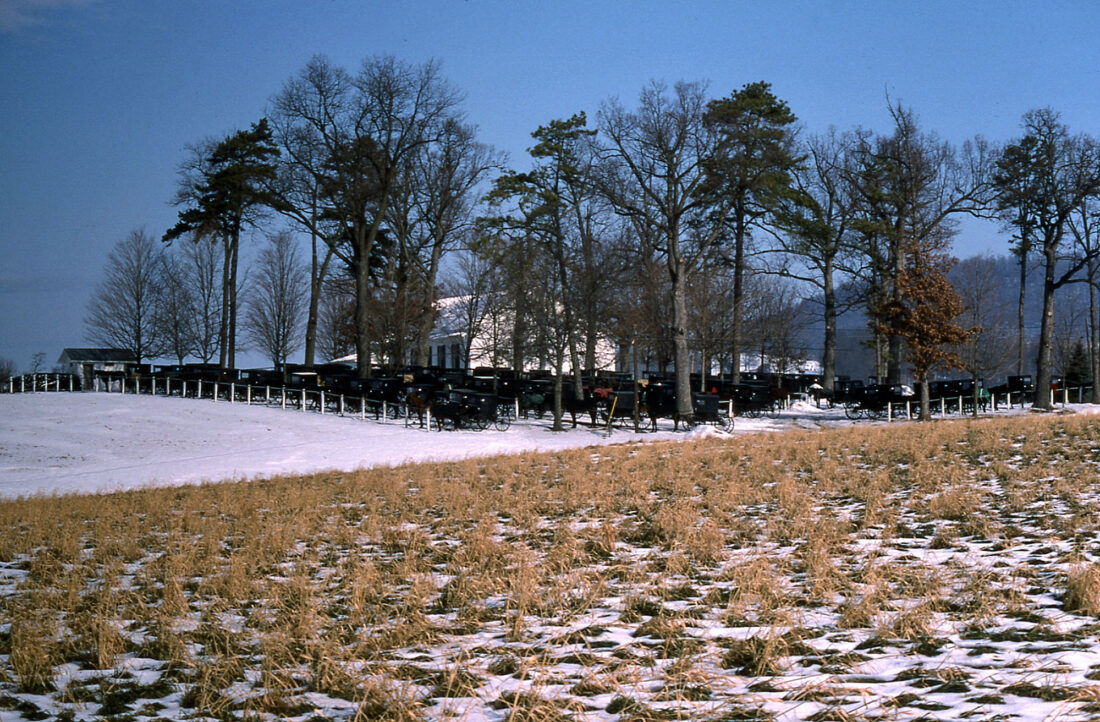
We have over fifteen different Mennonite groups in the Shenandoah Valley of Virginia. The cultural differences between my community in the Virginia Mennonite Conference and the Old Order groups in Rockingham County are about as far as the divide stretches. Two Virginia Conference pastors joined me in paying respects to brother Lewis G. Martin (1932-2022). We drove our car around buggies on the way to the funeral, and we slowed down because of the numerous black-clad Old Orders walking to the funeral on a bright mid-winter morning. Buggies with horses tied to hitching posts filled the church lot, line after line of them, so the automobiles parked across the road in a field.
I wanted to pay my respects to Old Order Minister Lewis G. Martin. The ninety-year-old leader in our community, ordained fifty years ago, was widely known and appreciated. I only met Lewis a couple of times, but he often provided information about the Old Order community to former editors of the Shenandoah Mennonite Historian and me. Lewis understood that someone needed to speak from within the Old Order community to Anabaptists beyond and offer details about the group’s size and history. Many buses and van-loads from local educational and cultural groups heard Lewis when they toured the Old Order community. When requested, Lewis took time away from his harness and leather goods shop, his bi-vocational means of making a living, and answered questions about the Old Order communities.
Six years ago, a busload of Mennonites took a tour of the Old Order community in Rockingham County. When we stopped at the Pleasant View Old Order meetinghouse, Lewis G. Martin spoke to us. At eighty-four, Lewis ably interpreted the meaning of the 1901 division in our community from which the Old Orders came. He discussed the late nineteenth-century troubles in Virginia Conference that led to sixty-nine being removed and starting the Virginia Old Orders. Lewis freely shared details about the order of his services, patterns of worship, length of sermons, and singing. I still value the notes I took when our large group listened to Minister Lewis G. Martin share his Anabaptist faith. He patiently answered all our questions.
As I make acquaintances and new friends across Mennonite groups in the Shenandoah Valley, I keep looking for our common Anabaptist faith. At Lewis’ funeral, I found Anabaptist faith in the lyrics and four-part harmonies of songs from a nineteenth-century hymn book placed in a wooden pew rack. Only the words appeared in the little book, but I soon joined the approximately 450 people inside the meetinghouse who were lifting their voices in song to God. Men around me sang the bass part, and I quickly caught on and entered the hymns. The singing was slow, mournful, and reflective of the community’s genuine heartfelt loss of a respected senior minister. The harmonies and theology about eternity gave me time to think about my own frailties and brief time on this planet.
Lewis G. Martin told our tour group that the Virginia Old Orders have fellowship with groups in other states. So, among the four sermons preached during the two-hour funeral service were visiting ministers from Berks County, Pennsylvania, and another minister from an Old Order community in Canada. Both visiting ministers had a Pennsylvania German accent, though they spoke in English at Lewis’ funeral because Virginia Old Order Mennonites speak English. The Riverdale Conference has a group of families who moved to a new settlement in Greenfield, Ohio.
Sitting next to me on the hard wooden slatted bench was a man who held a young son in his lap and another six or seven-year-old son who sat at the end of the bench. Both boys sat quietly, did not have toys to play with, and did not go out during the two-hour service. More importantly, this generous man answered my whispered questions about the Old Orders. There was no program to look at, and no one announced the names of the ministers who spoke, but my new Old Order friend helped me as I scribbled notes. Twice we knelt for long prayers with deep meaning of faith embedded in the minister’s words.
When the service began, I noticed the windows were opened from the outside, allowing a winter’s day breeze to keep the large audience comfortable. Attendees filled every bench. But the windows were opened so the dozens of boys and young men who had no seats and stood outside could listen to the sermons through the windows. With no microphone, it was hard for me to hear inside, and I suspect the fellows outside heard very little. The Pleasant View Order Mennonite meetinghouse has an electric line attached, but it is only used to power the forced-air furnace in the basement. There are no electric lights in the building.
Three years ago, I wrote Lewis G. Martin a letter, asking him about which side of the auditorium the women sit on in the Old Order community. He cordially replied with a handwritten note. Facing the audience from the pulpit, he explained that the women sit on the right, similar to the other Mennonite churches in the Valley during the nineteenth century. Men at the funeral wore plain black coats and black hats. Hooks on the wall all around the interior provided a place to hang them during the service. Looking from the long nineteenth-century style wooden minister’s pulpit, with about ten ordained men seated behind on a raised platform, women and girls sat on the right side of the three-foot wall in the center of the room. They wore funeral black, including their tightly-tied bonnets.
My Anabaptist heritage is Amish-Mennonite, going back eleven generations to the seventeenth-century Amish division in Europe when Yost Yoder chose the Amish side of that split. My parents left the Amish and joined the Conservative Mennonite Conference in 1950, and I joined the Mennonite Church in 1981. I have hundreds of relatives among plain Anabaptist groups in Central America and the United States. So, when I went to Lewis’ funeral, I wanted to pay my respects since I’m on a journey to find common Anabaptist faith among friends and neighbors in the Shenandoah Valley. Lewis generously provided information for my research, writing, and editorial work.
In two years, we will remember and notice the 500th anniversary of the beginning of the Anabaptist movement in Zurich, Switzerland. May we, in our Anabaptist communities, regardless of our chosen practices, find common faith in God, Jesus Christ our Savior, and the illimitable love and charity of the Holy Spirit, which can join us together in Christian unity.
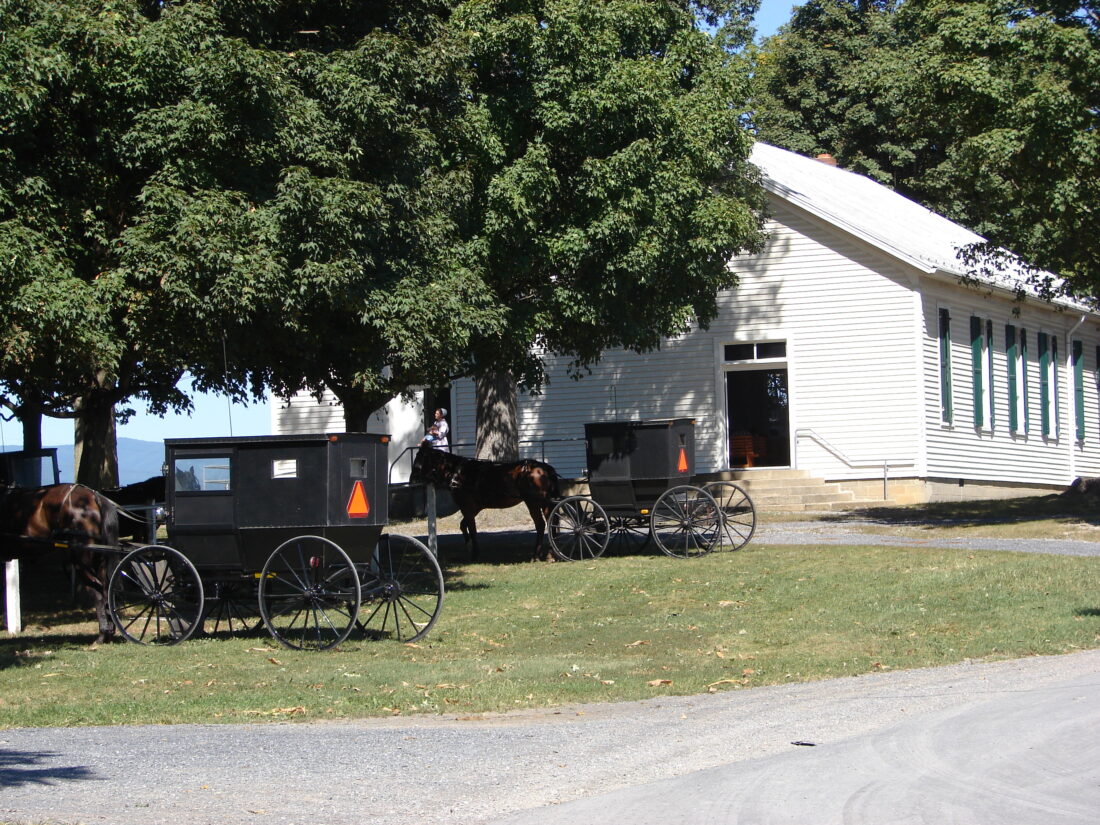
Harmonia Sacra Singing Jan. 1, 2023
The annual Harmonia Sacra singing in the Shenandoah Valley took place on New Year’s day, as it has since 1902. Around two hundred singers attended, from numerous religious groups and twelve states. About twenty song leaders led twenty-four hymns from Joseph Funk’s Harmonia Sacra songbook.
I especially liked the song called Lexington, by William Cowper, 1779: “Sometimes a light surprises the Christian while he sings. It is the Lord who rises, with healing in His wings; When comforts are declining, He grants the soul again a season of clear shining, to cheer it after rain.”
We sang this year at Park View Mennonite Church (pictured), Harrisonburg, Va., since the traditional site, Weavers Mennonite Church, was being renovated.
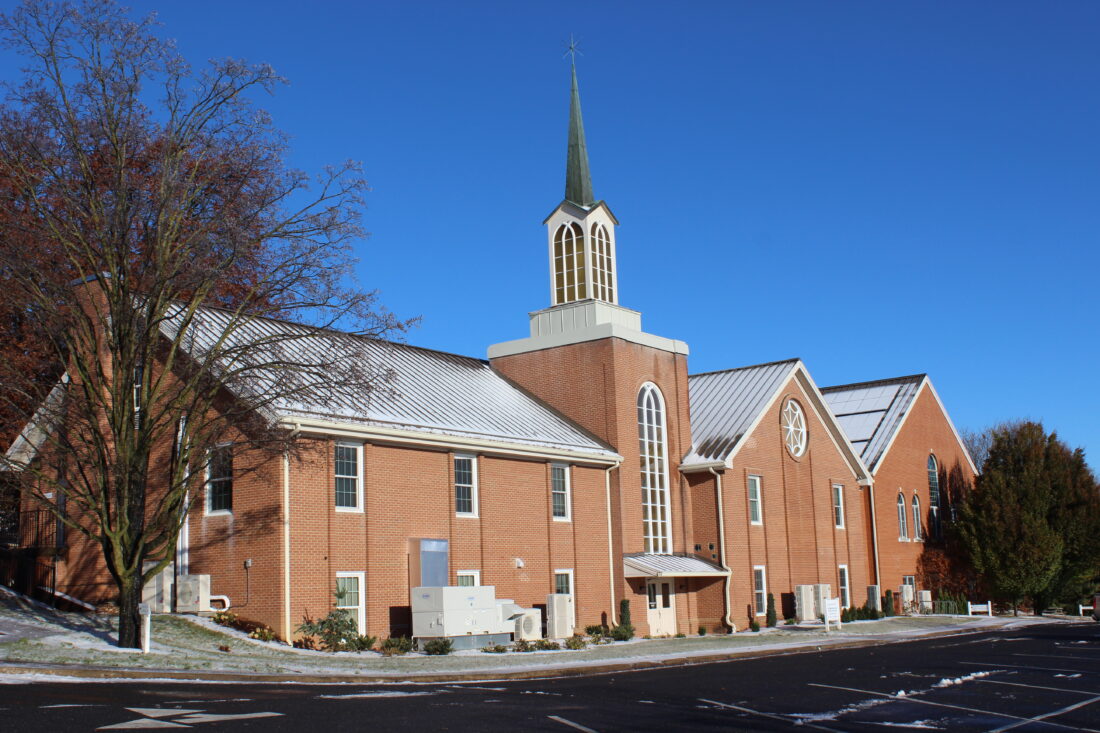
The Holy Spirit Gives Gifts
Buckhorn Mennonite Church

Buckhorn Mennonite Church began in 1930 when itinerant ministers invited people to gather and hear preaching in the local public schoolhouse. For forty-three years, Buckhorn church served a remote highlands community in Hardy County, West Virginia. In 1973, Buckhorn merged with nearby Cove, Cullers Run, and Mt. Hermon to form Mathias Mennonite Church, an MC USA congregation in the Virginia Conference.
Young adults from Trissels, Zion, and Lindale congregations followed their ministers into the highlands, teaching Summer Bible School and Sunday school during the ‘30s and ‘40s. Maude Geil (Lantz), twenty-one, taught Bible School at Buckhorn in 1940. During the day, Maude instructed children in the schoolhouse or outside, and she stayed overnight in a tent or a trailer that Northern District business people supplied for the two-week Summer Bible School sessions.
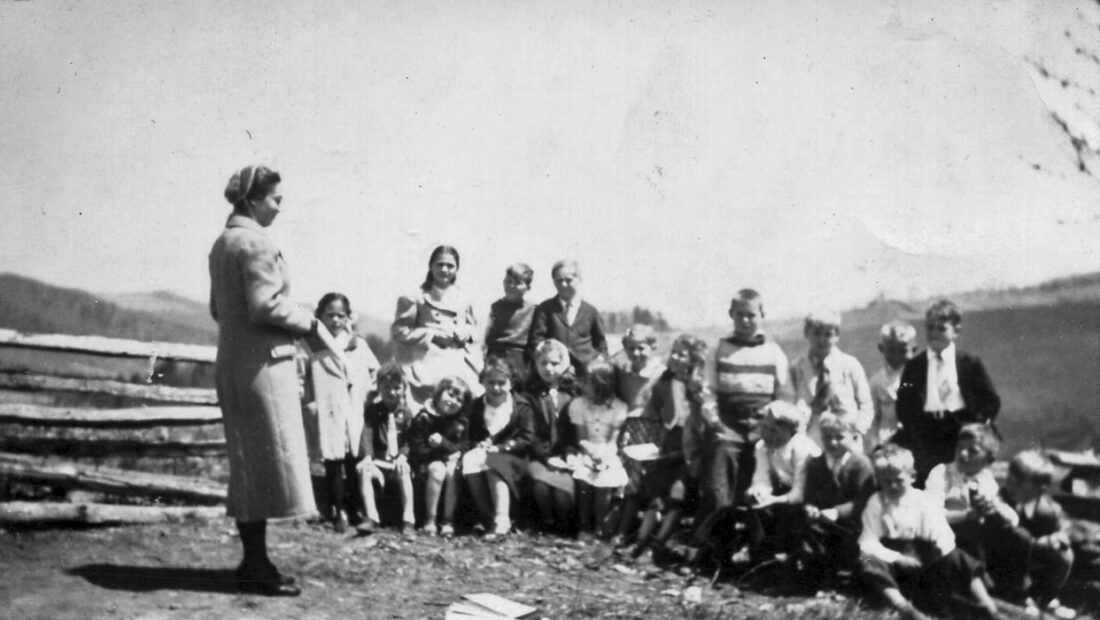
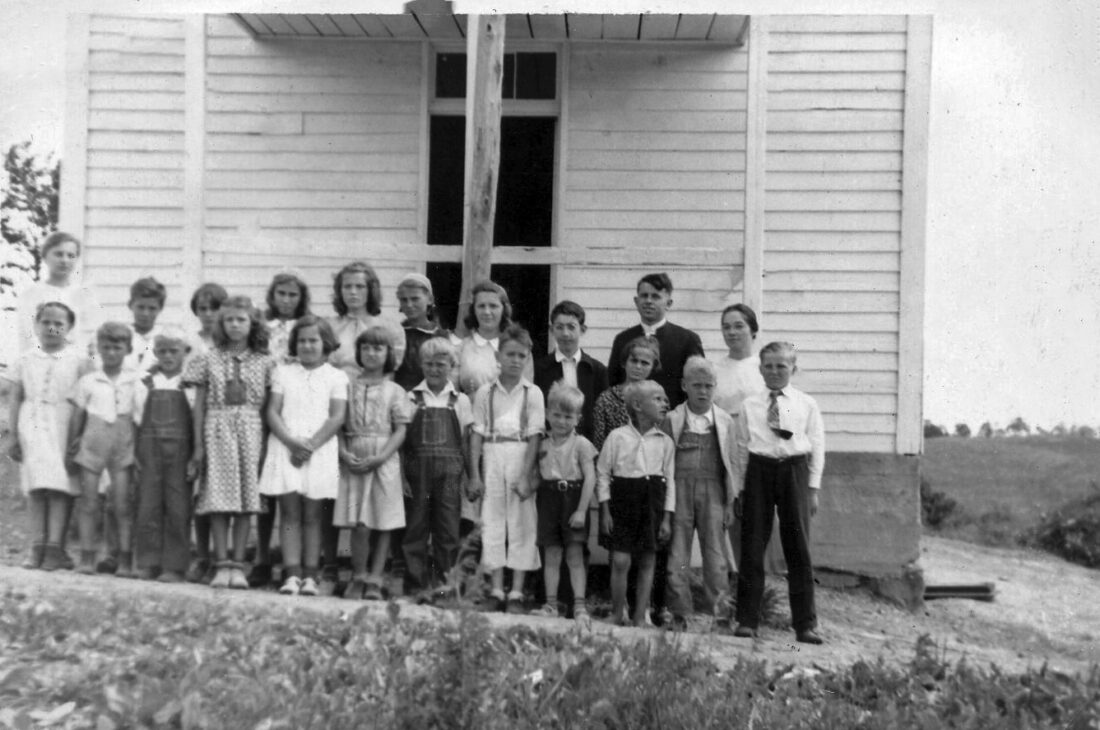
Young adults like Maude Geil, Robert Alger, Kathryn V. Showalter (Shank), and Linden Wenger supportively drove to Buckhorn, about thirty miles north of Broadway, Va., to teach and encourage the folks in this remote region. Dozens of Virginia Conference young adults taught Summer Bible School in the highlands during the ‘30s and ‘40s.
A small Mennonite community emerged at Buckhorn in the 1930s, with ministers on a preaching calendar coming to the schoolhouse about once a month for worship services. During winter, services didn’t always occur because of impassable roads. But there was a cycle of annual communion services and occasional baptisms when a bishop came to lead the service.
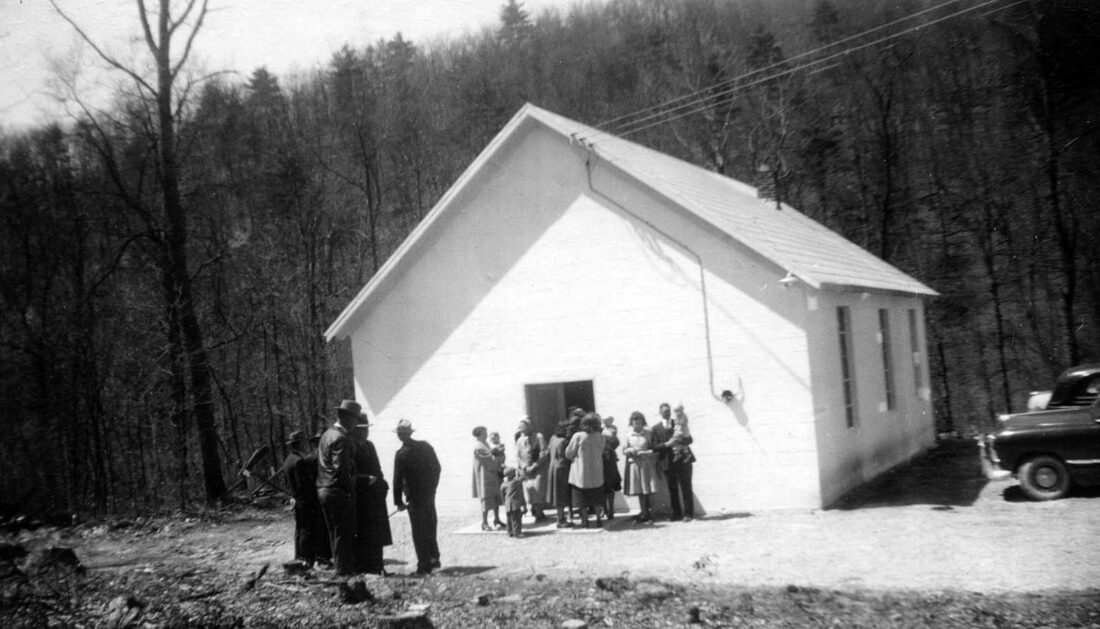
Buckhorn was among two dozen Northern District congregations that emerged in the early twentieth century missions awakening, the work of Virginia Conference itinerant ministers in the highlands of Virginia and West Virginia. Mennonite youth followed, like Helen Trumbo (Shank), who, at 17-18 years of age, taught five Bible School sessions of two weeks each during one summer in the early 1940s.
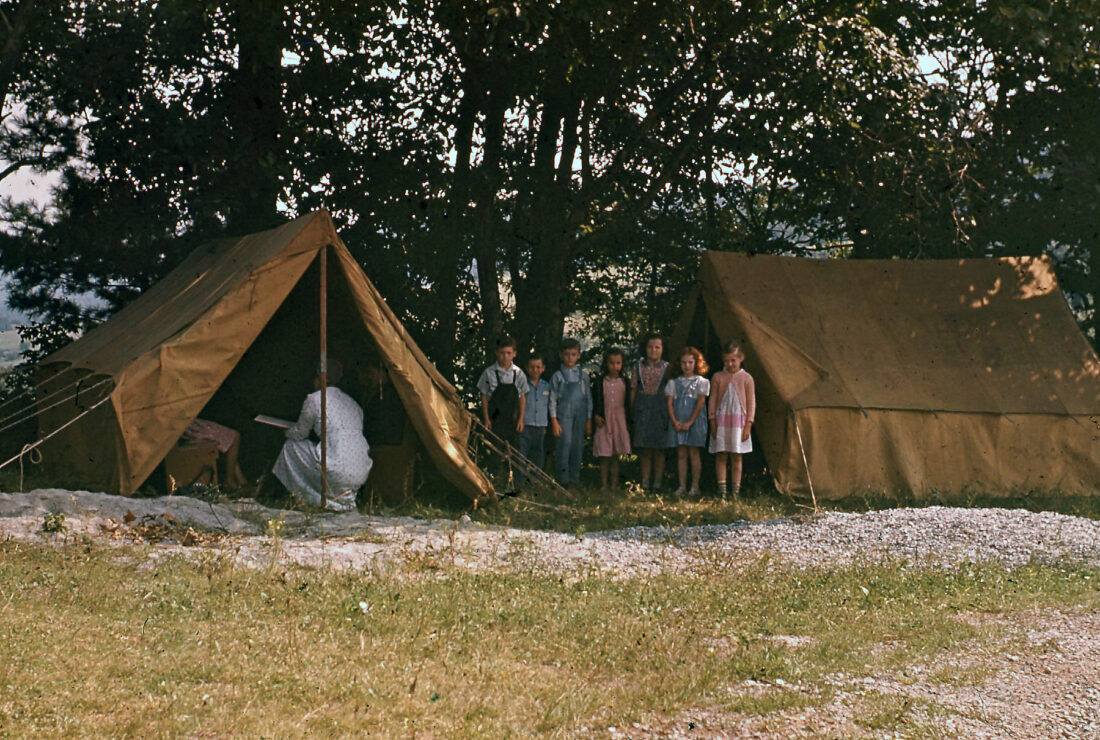

In 1948 the small Mennonite congregation in Buckhorn asked District ministers to help them build a meetinghouse. In May 1949, Bishop Timothy Showalter preached a dedication sermon for the new cinderblock building. Mennonite evangelist William Jennings, from a Virginia Conference congregation in Tennessee, followed with revival meetings at the church.
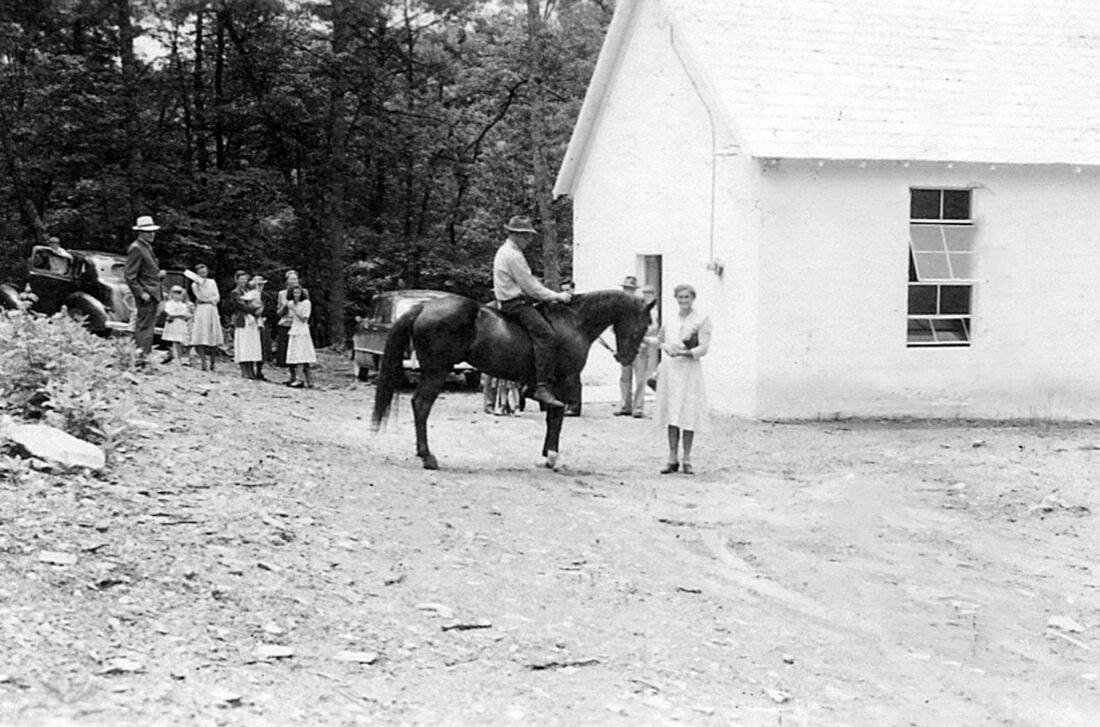
During the 1930s and ‘40s, dozens of young adults in Virginia Conference taught Summer Bible School in the highlands. At the same time, city mission churches began, prompted by dynamic mission energy. Further, missionary speakers from India, Africa, and South America helped Virginia Mennonites see beyond their home-based mission efforts. In one remote mountain setting, however, at Buckhorn Mennonite Church, near the Lost River State Park, Mathias, W.Va., Conference ministers and lay workers helped build a congregation during a several-decade season of Holy Spirit-inspired mission.
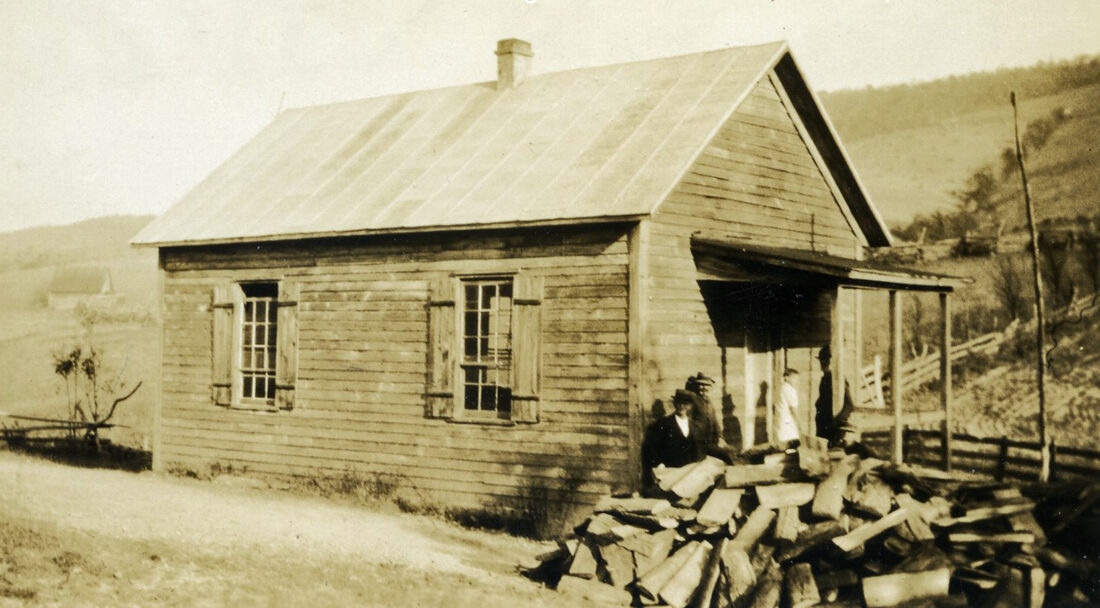
The Holy Spirit Gives Gifts
An address given to Virginia Mennonite Conference, July 15, 2022, under the oaks at Trissels Mennonite Church, using Acts 2:1-4; 14-21; Video of the address.
The Holy Spirit empowers congregations for ministry, service, and witness. When the believers at Pentecost received the Spirit, they moved out from their Jerusalem home base. Spirit-empowered mission is my theme.
The Spirit has gifted this congregation for the past two hundred years with multiple gifts. All of our congregations have received Holy Spirit gifts. The four gifts I’ll mention are hospitality, generosity, itinerancy, and ministry.
Here’s an illustrative story. Two weeks ago, I drove about thirty miles north of here into Hardy County, West Virginia. Hidden back in the woods next to the Lost River State Park, I found the block building of the former Buckhorn Church, built by Trissels folks and others in the Northern District.
Northern District ministers began their itinerancy to the Buckhorn community in 1930, and held meetings in the local schoolhouse. During the ‘30s and ‘40s, young adults followed and taught Summer Bible School and Sunday school. In the 40s the Summer Bible School program thrived. Maude Geil, Robert Alger, and Linden Wenger were among those dozens of young adults who went to Buckhorn in ministry and taught. Men from the Buckhorn would come to Rockingham County and work on Mennonite farms during harvest season. They were shown hospitality.
When the folks at Buckhorn asked Northern District ministers if they could have their own meetinghouse, the ministers raised the money in the home base churches. Home base churches were generous with money and labor to build a cinder block structure in 1948.
All four gifts (hospitality, generosity, itinerancy, and ministry) came together in that Northern District outpost, a remote region in mountainous Hardy County. In the early 1970s, Buckhorn merged with Cove, Cullers Run, and Mt. Hermon to form Mathias Mennonite Church.
Hospitality (1): “The wind came from heaven and filled the whole house where they were sitting (Acts 2:2)”, probably while they were eating a meal. Did you know that the Mennonite Community Cookbook emerged out of the Trissels congregation? In 1950, Mary Emma Showalter Eby (1913-2003) completed her best-selling cookbook, published by Herald Press in 65 editions. Over 500,000 of the books have sold, making it the best-selling book of any EMC or EMU faculty member. Mary requested recipes, and she received several thousand, with some mailing their entire cookbook to her home in Broadway. She chose over 1100 recipes, including from a half dozen Trissels women and another half dozen from women in Hartville, Ohio. Mary Emma’s cookbook was a gift of hospitality to her church, her conference, her denomination, our dinner tables, and far beyond.
When the Mennonite General Conference met in Harrisonburg in August 1919, preliminary meetings took place at Zion and Trissels, with Bishop Lewis and Mattie Shank’s kitchen table being the hub of activities. Gospel Herald Editor Daniel Kauffman came to Broadway for those meetings. After almost every Mennonite family in the area helped host the 1000 visitors who came, and after the Virginians gave a surplus offering of $1000 for missions above expenses, Daniel Kauffman wrote that “When it comes to hospitality the Virginia brethren never do things by halves.” (GH April 8, 1920)
Seventy years ago, July 23-25, 1952, for the tenth time, Trissels hosted the annual Virginia Conference meetings. Moderator Truman H. Brunk Sr. welcomed newly ordained ministers Norman Derstine, Dan Smucker, and Myron Augsburger. At the end of the Conference, the delegates passed a resolution of thanks to the Northern District for the kind hospitality shown to the delegates.
Three years ago, on September 9, 2019, the Trissels Hospitality Committee, with Zola Showalter and LuAnn Bender, showed wonderful hospitality in a pre-covid world, serving a light meal to twenty-nine delegates and guests of the Northern District Council. Trissels did it again, offering up gracious southern hospitality.
The Spirit’s gift of hospitality flows out of a Christian commitment to serve the spiritual, physical, and economic needs of others. “Practice hospitality (Romans 12:13), and all of them were filled with the Holy Spirit”
Generosity (2) Laura and Steve Campbell just returned after ten years of missionary work with VMM in Montenegro. Trissels gave generously to their work, and two leaders from this congregation served on their Ministry Support Team. They worked in a city where only a few have seen the light of Christ. I’ve read articles about their work, attended a fundraiser or two, and taught Laura in world history, but only recently learned that Laura Moyers Campbell is an eighth-generation descendant of Daniel and Margaret Showalter (Margaret died 1816 and Daniel died 1822). The historical records I’ve seen show that Trissels has been a generous congregation, supporting both the Conference and Virginia Mennonite Missions. A co-chair of the VMM capital campaign attends this congregation.
Some of you knew Mary Brunk Moyers (1913-2008), an outstanding quilter. She was also a generous woman. For sixty years attending here, she made around a hundred quilts that she donated to the Virginia Relief Sale. In 1987, Mary’s four quilts brought $5000. In 1988, Mary’s “Jacobs’s Fan” brought an all-time high of $5000. Mary and the Trissels Sewing Circle, since 1920, have been generous with their skills and service work.
The Spirit’s gift of generosity at Trissels extends to neighbors near and far. “All the believers were together and had everything in common. They sold property and possessions to give to anyone who had need (Acts 2:44-45), and all of them were filled with the Holy Spirit”
Itinerancy (3): “The Holy Spirit said, ‘set apart Barnabus and Paul for the work to which I have called them’…and the believers sent them off. (Acts 13:2-3)” Similar to the first-century itinerancy of the apostles, a quickening, an awakening, a Spirit-inspired mission’s impulse moved among Virginia Mennonites after the Civil War. Leaders saddled up and rode into the western highlands. Spurred by a desire to preach the gospel, Mennonite ministers rode to remote mountain regions and preached in schoolhouses, union churches, and people’s homes. In some locations, like Buckhorn, the Northern District built meetinghouses for new churches.
Inspired partly by the wider Protestant mission’s movement, Northern District ministers traveled like itinerant apostles in the Book of Acts, going from one place to the next, preaching the good news of the gospel of Jesus Christ, because they believed in the good news of Jesus. And all of them were filled with the Holy Spirit.
Bishop Samuel Shank Sr. led the way in the Northern District and went into West Virginia even before the Civil War. He was followed by bishops John Geil, Abraham Shank, and Lewis Shank. Itinerant ministers rode thousands of miles on horseback and carriage, and then automobile. Their ranks include Samuel Shank Jr., George B. Showalter, Mark C. Showalter Sr., Perry E. Shank, Timothy Showalter, Joseph W. Geil, J. Hopkins Turner, and Samuel A. Shank.
John S. Coffman was a renowned Mennonite evangelist of the late 19th century. John Coffman grew up in the Virginia Conference. At age 26, in October 1876, he traveled with Northern District minister Samuel Shank Jr. on a three-day horseback riding jaunt to schoolhouses and churches north of Trissels. Coffman and Shank stayed in the homes of local people, and they preached wherever folks would listen to their messages. They went to Lost River, Baker, and Wardensville. Coffman’s journal is how we know details. It is hardly an overstatement to say that a Virginia man sparked the late nineteenth-century missions awakening in the Mennonite Church which came right down into this church.
About twenty years ago, Martha Shank Whissen (1914-2019) brought her father’s oil lantern along to church at Zion. Perry E. Shank, her father, served Trissels and the Northern District for over fifty years as a minister. At age 83 Perry attended the 1952 Conference here at Trissels. A farmer from Broadway with little education, Perry was ordained by lot. Perry rode horseback, carriage, and car into the mountains. Perry used an oil lantern on his buggy when driving at night. In the early twentieth century, Perry ministered in several dozen schoolhouses and churches of the Northern District. He believed in mission. He’d leave on Friday from his Broadway farm and come home late Sunday evening, with his lantern. J. Ward Shank tells of his father leaving after a Sunday evening service, having three flat tires on the way home, and arriving at 4 a.m. (HAB 54)
In the late 19th and early 20th centuries, Trissels and ND ministers launched an itinerant mission’s movement that inspired a host of young adults from this church, the Northern District, and the Virginia Conference. Twenty-two churches emerged in the highlands, like Buckhorn, and it was considered home mission, done without the support of a mission board.
Spirit-gifted itinerant bishops, ministers, and deacons went out with a desire to preach the gospel, minister to others, and build up the kingdom. “(Acts 16:9-10) Come over to Macedonia and help us, and so Paul and his itinerant companions got ready at once to preach the gospel…and they were all filled with the Holy Spirit.”
Ministry (4) The era of itinerancy from leaders prompted a quickening, an awakening, a movement of the Spirit among Virginia Mennonites, that lasts to this day. Four stories to illustrate. Mattie Shank traveled with her bishop husband for decades, assisting his work of visitation, counseling women, helping with communion, attending funerals, and providing coverings and bonnets. Though not ordained a deaconess, she operated like one. One of the largest early twentieth-century funerals at Trissels and Zion was of Mattie Shank, in 1934 when hundreds came to pay their respects.
Elizabeth A. Showalter (1907-1998) was one of the pioneers of the Summer Bible School program in the Northern District and the Mennonite Church. She followed her father, George B. Showalter, who had ridden hundreds of preaching itinerant circuits into West Virginia. Elizabeth taught Sunday School and developed Summer Bible School curriculum. Elizabeth said that in 1938 over half the 1050 Northern District Mennonites were folks in the highlands. Elizabeth knew of eleven Sunday schools in the district, needing 70-80 workers to staff the classes, with 25-70 students in each location. Elizabeth reported that to go from the home base in Broadway to each of the preaching appointments separately, one would travel 1500 miles. There’s a fun photo in the history book of Elizabeth taking twenty children in her car to Summer Bible School at Hebron, in Fulks Run. Summer Bible Schools began in the Northern District in 1932, and Elizabeth helped pioneer and energize the work. During the 1930s and 1940s, there was nothing like this anywhere in the Mennonite Church. Harry A. Brunk uses a page and a half of fine print to list all the youth. Elizabeth took her experience in the highlands to Scottdale and wrote Summer Bible School curriculum for the Mennonite Church. She edited Words of Cheer and was known as “Aunt Beth” to her readers. In 1961, she began “Books Abroad,” in the red barn, to furnish donated used books for institutions and persons overseas.
Helen Trumbo Shank (1925-2020) was among those dozens of youths in the 1940s from Trissels, Zion, and Lindale who volunteered their summers and traveled into the highlands to conduct summer Bible school. Helen remembered that during one summer in the early 1940s, maybe 17-18, she taught five Summer Bible School sessions of two weeks each. Business people in the district provided her a trailer or a tent while she lived away from home. The Mennonite community encouraged their young people in this local mission’s endeavor, and responsive young adults reveled in the mission impulse of their home base church communities. Helen remembered visiting mountain homes in the afternoons and evenings. At mealtime on one occasion, Helen recalls, with three teachers, “One got a spoon, one a fork, and one a knife.”
Amanda Showalter (1891-1980) often accompanied her husband Mark C. Showalter Sr. (1895-1978) to highland churches where they served as energetic and dynamic Mennonite mission developers. Married in 1919, Amanda and MC gave their best years to small congregations. Mark used his poultry industry business skills to help families earn an income and provide for their needs. MC first convinced a family to build a brooder house, then he supplied a wood-burning brooder stove, chicks, and feed. Fourteen weeks later he marketed the birds and paid the family.
For over twenty years Amanda and MC helped raise up Salem Mennonite Church, Hardy County, W. Va. Then in the early 1950s, Amanda and MC helped start the Stephens City Mennonite Church. Amanda and Mark were seldom seen on Sunday mornings at Trissels or Zion. Instead, they drove to mission stations to support small mountain churches. Oh, Amanda and MC offered itinerant ministers and Summer Bible School workers “gospel gas,” where all you had to do was stop at their farm, fill up your vehicle, and write down how many gallons you pumped.
My call is that God would spark a quickening, an awakening of Holy Spirit gifts for mission in our era. Mission is to the church as fire is to burning, 1963. Outreach the reason for the 1965 Educational wing. Four community families joined here in the 1960s. I’m calling for a home-based mission awakening, to neighbors and friends nearby, like when Nelson Swope began a Sunday morning ministry at Living Water Senior Care in Timberville, in 1990, and this congregation rallied to help. I raise this missional vision praying and believing that with Holy Spirit gifts like hospitality, generosity, itinerancy, and ministry, we can reenergize our churches to focus on mission once again. A focus on mission in the VMC strategic plan, the Conference mission statement, and now is the time to refocus and energize that Holy Spirit vision.
Our Master called us to “Go and make disciples of all nations, baptizing them in the name of the Father and of the Son and of the Holy Spirit, and teaching them to obey everything I have commanded you. And surely, I am with you always, to the very end of the age.”
Sausage Eating Event March 9, 2022
Come we that love the Lord
Isaac Watts wrote one of the great hymns of the church in the early 1700s, with music added later by Robert Lowry. “Come we that love the Lord” invites singers into worship in energizing and enlivening ways.
I enjoy singing the song in worship because I’ve attended a church named Zion for many years. Our church is situated on a hillside, like the ancient Zion in Israel. Watts wrote that the hill of Zion yields a thousand sacred sweets before we reach the heavenly fields.
The lyrics and tune of this song tend toward a marching effect. We are invited to join in song as we look toward the holy Zion of God’s presence and Spirit, which surrounds us in holiness as we march toward God’s holy hill.
Then let our songs abound, and every tear be dry, Watts penned. We’re marching through Immanuel’s ground to fairer worlds on high, the beautiful city of God.